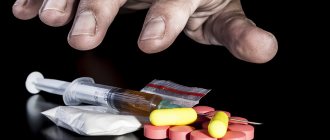1. Propaganda or illegal advertising of narcotic drugs, psychotropic substances or their precursors, plants containing narcotic drugs or psychotropic substances or their precursors, and their parts containing narcotic drugs or psychotropic substances or their precursors, as well as new potentially dangerous psychoactive substances -
shall entail the imposition of an administrative fine on citizens in the amount of four thousand to five thousand rubles with confiscation of advertising products and equipment used for their production; for officials - from forty thousand to fifty thousand rubles; for persons carrying out entrepreneurial activities without forming a legal entity - from forty thousand to fifty thousand rubles with confiscation of advertising products and equipment used for their production or administrative suspension of activities for up to ninety days with confiscation of advertising products and equipment used for their production ; for legal entities - from eight hundred thousand to one million rubles with confiscation of advertising products and equipment used for their production or administrative suspension of activities for up to ninety days with confiscation of advertising products and equipment used for their production.
1.1. Propaganda of narcotic drugs, psychotropic substances or their precursors, plants containing narcotic drugs, psychotropic substances or their precursors, their parts containing narcotic drugs, psychotropic substances or their precursors, or new potentially dangerous psychoactive substances using the Internet information and telecommunications network —
entails the imposition of an administrative fine on citizens in the amount of five thousand to thirty thousand rubles; for officials - from fifty thousand to one hundred thousand rubles; for persons carrying out entrepreneurial activities without forming a legal entity - from fifty thousand to one hundred thousand rubles or administrative suspension of activities for a period of up to ninety days; for legal entities - from one million to one million five hundred thousand rubles or administrative suspension of activities for up to ninety days.
2. Actions provided for in parts 1 and 1.1 of this article, committed by a foreign citizen or stateless person -
shall entail the imposition of an administrative fine in the amount of four thousand to thirty thousand rubles with or without administrative deportation from the Russian Federation, or administrative arrest for a term of up to fifteen days with or without administrative deportation from the Russian Federation.
Note. It is not an administrative offense to distribute information in specialized publications intended for medical and pharmaceutical workers about narcotic drugs, psychotropic substances and their precursors approved for medical use.
- Article 6.12. Receiving income from prostitution, if this income is related to another person’s involvement in prostitution
- Article 6.13.1. Promotion of nitrous oxide
Legal prosecution for promoting drugs and psychotropic drugs
Propaganda of drugs and psychotropic substances refers to the actions of individuals and legal entities aimed at:
- bringing to people information about the methods and methods of production, preparation and use, places of purchase of prohibited substances;
- production and distribution of printed materials, as well as the use of the media and the Internet to post such information.
The ultimate goal of the above actions is to persuade a person to use prohibited substances.
Russian legislation provides for two types of prosecution for drug promotion activities:
- administrative;
- criminal.
In the first case, this is Article 6.13 of the Code of Administrative Offenses of the Russian Federation. The second contains Article 230 of the Criminal Code of the Russian Federation, which we will consider in more detail.
According to this provision of the Criminal Code, liability arises for inducing a person to use narcotic, psychotropic substances or their analogues. The sanction depends on the subject of the crime, the object of the attack, the circumstances surrounding the act and the resulting consequences.
For example, if under the first part of the article the maximum punishment provides for imprisonment of up to five years (a crime of moderate gravity), then under the third part (when the victim has not reached the age of majority or has died, or has become a drug addict, is seriously ill or has committed suicide) you can say goodbye to freedom for up to fifteen years (and this is a particularly serious crime).
Important! Article 230 of the Criminal Code has a note according to which criminal liability does not arise for promoting the use of tools and equipment for the use of drugs and psychotropic substances for the purpose of preventing dangerous diseases, if these activities have been appropriately coordinated with authorities and law enforcement officers.
Factors for the court
When considering a case, the court takes into account the following factors:
- whether the citizen who transports them uses NS;
- how large a quantity of drugs a person is transporting;
- whether the drugs were packaged.
Amount of drug
What matters to the court is the amount of the drug transported. It is assessed on three scales:
- significant volume;
- large;
- especially large.
Naturally, the degree of responsibility (increasingly) depends on the quantity.
Interesting: The amount of marijuana in powder form is considered significant when it exceeds 6 grams. If 100 grams are transported. and more is already a large volume. Extra large - from 500 g.
The punishment imposed by the court depends on the amount of the substance. For example, from 100 gr. up to 500 gr. - this is a large volume. But at the same time, a citizen transporting 100 grams is given a lighter punishment than one who transported 400 grams.
Type of drug
In legislation, NS is not divided into types. There is no concept of “heavy” or “light” matter. But at the same time, the type of drug still affects the retribution that the court will ultimately impose. For example: marijuana will most likely be punished less than cocaine, since the first substance causes less harm to human health.
Administrative responsibility
Administrative legislation provides for a separate article for drug propaganda.
The main purpose of establishing this type of liability is to combat illicit trafficking in prohibited substances and protect the health and lives of people. Sanctions are applied when disseminating information about narcotic and psychotropic drugs or their precursors, regardless of the form in which the information is submitted.
Attention! In order to create an offense, it is necessary that the substances contained in the corresponding list of substances prohibited for free circulation be promoted or advertised.
What is the liability for transporting drugs?
The severity of the punishment for the described crime depends on the size of the NS and PV transported. If it is assessed as significant, then, in accordance with Part 1 of Article 228, other types of punishment may be applied in addition to imprisonment. But for the transportation of substances and substances in large and especially large quantities, only imprisonment is provided. The reason for this is the classification of crimes as grave and especially grave. If the size of the transported prohibited product is estimated to be less than significant, the offender will be brought to administrative responsibility.
The punishment for transporting drugs is quite severe, but the law provides for the possibility of avoiding it. If you contact a lawyer, he will tell you how to act in such a situation. According to the law, it is possible to be released from criminal liability for a crime committed if a certain set of conditions are met, namely:
- hand over drugs voluntarily, even if they were intended for personal use;
- assist the investigation in solving the crime;
- provide available information about other persons related to the crime.
Attention! Surrendering a drug during investigative measures or in response to an offer to do so of one's own free will does not exempt one from criminal liability. But this fact is taken into account as a mitigating circumstance.
But even in situations where drugs are discovered during operational search activities, the Law of the Russian Federation still provides for the possibility of avoiding punishment. What do you need to know about this? If the crime is classified as minor, and the citizen has committed it for the first time, then the lawyer can petition the magistrates to have his client released from criminal liability. The active repentance of the defendant can be cited as an argument. It consists of turning yourself in. It is worth noting that the court has the right to apply this rule, but is not obliged to do so.
Recent practice shows that criminal cases related to illegal manipulations related to drugs are dropped extremely rarely, and the same applies to the grounds for exemption from liability. It is advisable to conclude that in this case it is impossible to do without the qualified assistance of a lawyer.
Legal commentary on Article 6.13 of the Code of Administrative Offenses of the Russian Federation
Like any administrative offense, this article has:
- subject (offender subject to responsibility for his actions);
- object (health, life, public order and morality);
- the subjective side (direct intent, since actions to promote and advertise prohibited substances are carried out deliberately);
- objective side (actions of the offender aimed at promoting and advertising prohibited substances and plants).
All of the above points together form the composition of Article 6.13 of the Code of Administrative Offenses of the Russian Federation.
Responsibility arises when promoting or knowingly illegal advertising of drugs, psychotropic substances, their precursors, as well as narcotic plants and precursors, potentially dangerous new psychoactive substances . The offender’s goal is to attract people’s attention and make them want to purchase prohibited drugs.
Important! Administrative punishment under this article is not applied when disseminating information about drugs, psychotropic substances and their precursors in special publications for medical and pharmaceutical workers, if such drugs can be prescribed for medical purposes.
What is “drug transportation”
The definition of drug transportation was given by the Plenum of the Supreme Court in 2006.
According to it, illegal transportation includes the transportation of drugs across the country without the intent to sell psychotropic drugs on any type of transport. In order to clearly define the crime, law enforcement agencies must answer the following questions:
- where and where the drugs were transported;
- characteristics of drugs;
- NS volume;
- purpose of transportation;
- attacker's intent.
Important: If a citizen is found to have a small amount of HC, suitable only for personal use, such an offense cannot be classified as transportation.
What circumstances does the court take into account?
Based on the mandatory and qualifying signs of a criminal act, which are listed in Art. 228 of the Criminal Code of the Russian Federation, the court will have to determine many important circumstances - the sanity of the defendant, the presence of direct intent to transport drugs, the size and volume of drugs seized, etc. At the same time, the method of transportation for imposing a penalty does not matter; this criterion is not included in the composition of the main and optional signs of a crime.
Let us consider the composition of the main elements of the charge that must be examined and assessed by the court in order to assign one of the possible penalties.
Size
The size (quantity) of prohibited drug substances will be of key importance for qualifying the crime. Article 228 of the Criminal Code of the Russian Federation delineates possible measures of liability for transportation as follows:
- under part 1 - with a significant amount of drugs;
- to apply Part 2, the prosecution must prove the presence of a large amount of narcotic substances or parts thereof;
- according to Part 3 - on a large scale.
Note!
For each individual type of narcotic drug, legislative acts establish independent signs of significant, large or especially large size. For this purpose, the standard values for each type specified in Resolution No. 1002 are used.
At the time of seizure, law enforcement officers do not have the right to independently determine their type and size. The protocol records only estimated data and approximate size. At the same time, police are required to describe in detail the method of transportation of the drug, the place where it was found, the condition and appearance of the packaging of the seized substance. After this, as part of the inquiry or investigation, a specialized examination will be appointed, which should give an objective conclusion on all the questions raised.
To determine the size of seized drugs, experts determine their mass after drying. If the drug is presented in liquid form or as a mixture, they estimate its volume in the appropriate units of measurement. The conclusion must necessarily contain information about the specific form of the drug or its analogue, as this will make it possible to determine its size.
Reclassification between different parts of Art. 228 of the Criminal Code of the Russian Federation makes it possible to significantly minimize the size of the imposed sanction. For example, the change to Part 1 of Art. 228 of the Criminal Code of the Russian Federation makes it possible to count on receiving a suspended sentence of imprisonment, and in the absence of a significant amount, we can only talk about punishment within the framework of the Code of Administrative Offenses of the Russian Federation.
Character
To apply criminal or administrative penalties, it is sufficient to establish the one-time nature of the crime. In relation to the transportation of narcotic substances, this has a logical justification - drugs are seized during a vehicle check and are documented in the form of a protocol.
Also, as part of the defense in a criminal case, it is necessary to pay attention to cases of planting of prohibited substances. Often, when searching vehicles, police officers have unlimited access to the car, which gives them the opportunity to plant illegal drugs on a citizen.
To complicate the task for the prosecution and gain additional grounds for protecting their rights, during a vehicle search you should refrain from independently removing unfamiliar objects, envelopes or packages. This will avoid leaving fingerprints on planted objects, as well as the appearance of traces of drugs on your hands or clothes.
Volume
The article for the transportation of drugs provides for liability only for a criminal act that does not involve the purpose of sale. Therefore, when investigating cases and considering them in court, it is important to establish the purposes for the acquisition and transportation of narcotic drugs.
Often, the prosecution creates flimsy evidence that creates the impression that the defendant has a goal for subsequent sales. For this purpose, false witnesses, as well as a number of indirect circumstances, can be used.
Note! Establishing the purpose of sales automatically excludes the crime under Art. 228 of the Criminal Code of the Russian Federation or Art. 6.8 of the Code of Administrative Offenses of the Russian Federation, and the penalties for such requalification will be significantly more severe.
Thus, at the stage of preliminary investigation and trial, the lawyer will have to make every effort to prove that the client purchased drugs for his own needs. In combination with other areas of protection, these points will significantly minimize possible sanctions for a citizen.
How to recognize a pawnbroker?
It is difficult to identify any external features of the “mortgagor”. You can recognize a “pawnbroker” by his actions: the attacker tries to hide something in an easily accessible but hardly accessible public place, after which he necessarily takes a photograph of him in order to subsequently pass the photo on to drug users.
In the reports of the Ministry of Internal Affairs, students, pensioners and even schoolchildren often turn out to be “mortgagors”.
Salt, spice, speed, ice. What is the connection between summer jobs, graffiti and flower beds? More details







